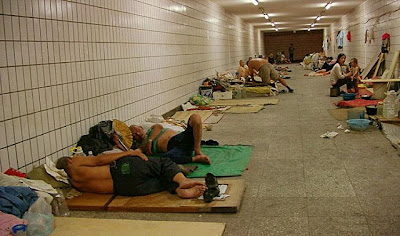China's Problems Driven Underground?
In a Beijing suburb, beneath one of the thousands of faceless residential tower blocks that have carpeted the city's peripheries in a decade-long building frenzy, one of Beijing's "bomb shelter hoteliers", as they are known, agrees to show us his wares.In a real estate bubble of epic proportions, China's upward-spiraling property prices are driving a million low income residents underground, and millions of others into squalor. In the quest to puff up China's economic numbers, the corrupt CCP is making life a misery for many tens of millions of ambitious, intelligent, hard-working people who deserve a more honest and trustworthy government.
...There, in the city's vast network of unused air defence bunkers, as many as a million people live in small, windowless rooms that rent for £30 to £50 a month, which is as much as many of the city's army of migrant labourers can afford. _Telegraph
Beijing is estimated to have 30 square miles of tunnels and basements, some constructed after the Sino-Soviet split of 1969, when Mao's China feared a Soviet missile strike, and many more constructed since to act as more modern emergency refuges. _TelegraphImages are courtesy of Impactlab
The fact Mr Zhao can easily rent out 150 such rooms, with the connivance of the city's Civil Defence Bureau with whom he has signed a five-year contract and invested nearly £150,000, is testament to China's massive unfulfilled demand for affordable housing.There are plenty of empty residential buildings -- enough empty space for as many as 50 to 100 million people, according to some accounts. Of course, many of those buildings were built using substandard materials and practises -- courtesy of corrupt government inspectors and officials. The high prices do not reflect the likelihood of very short lifetimes for much of China's construction.
"Some 80pc of our tenants are girls working in the wholesale market and the rest are peddlers selling vegetables or running sidewalk snack booths," he adds. "There are dozens of similar air defence basement projects in residential communities. In this area, they say 100,000 live underground."
Checking out the price of property above ground it is not difficult to see why. To buy a small flat (860 sq ft) in the tower block above – a typically grim, grey concrete affair – currently costs more than £200,000. In a city where the average monthly salary is 4,000 yuan, the average person would take 50 years to buy such an apartment, assuming they saved every penny they earned.
_Telegraph_via_ImpactLab
Labels: China



4 Comments:
How can anyone be bullish on China? This is another of a thousand examples I have read showing that China's foundation is a house of cards. I don't know what will cause the foundation to collapse but it will.
"deserve a more honest and trustworthy government"
There aren't any.
In China, the CCP controls all of the banks. Lending is conducted more on the basis of social connections, not sound business plans. Much of China's export industry operates on razor-thin margins if money is made; as a result, many loans go bad but China so far has shrugged this off through high growth. Is this sustainable? Ask Japan, whose banks lent money much the same way Chinese do now. (The difference? China is Japan on steroids.)
Couple this with China's unbelievable real estate market, the CCP's market meddling, high inflation and extensive poverty (despite China's growth, 1 billion people live on $2-3 per day or less), and it's not hard to see why China has a problem.
Not that there's reason to be optimistic of the US or EU - both have trouble in store for them. But in comparison, I believe China has bigger trouble in store for her - a crisis that's closer around the corner than most anticipate.
Chanos wasn't kidding when he said China will be "Dubai times 1,000."
"Of course, many of those buildings were built using substandard materials and practises..."
This crosses over to other forms of Chinese infrastructure. In China, recently-constructed dams develop cracks, bridges collapse and roads buckle or develop potholes - some of which are only about a year old. Construction companies resort to sandy concrete to construct buildings using unqualified personnel taking shortcuts galore; construction often runs 24-hours a day, six days a week. (can you imagine the state of Ordos's unoccupied buildings?) Also, regulations for weight limits are lacking, so trucks carry what the companies feel like loading up - thus deteriorating the road more quickly.
Several years back during a Chinese New Year, nasty weather struck and snapped some new power poles made of concrete. Again, substandard construction methods and material were used.
One of the funniest stories I read was about a recently-built bridge that developed pot holes only a year after completion. The construction company's solution? It filled the holes with super glue - I'm not making this up!
Post a Comment
“During times of universal deceit, telling the truth becomes a revolutionary act” _George Orwell
<< Home